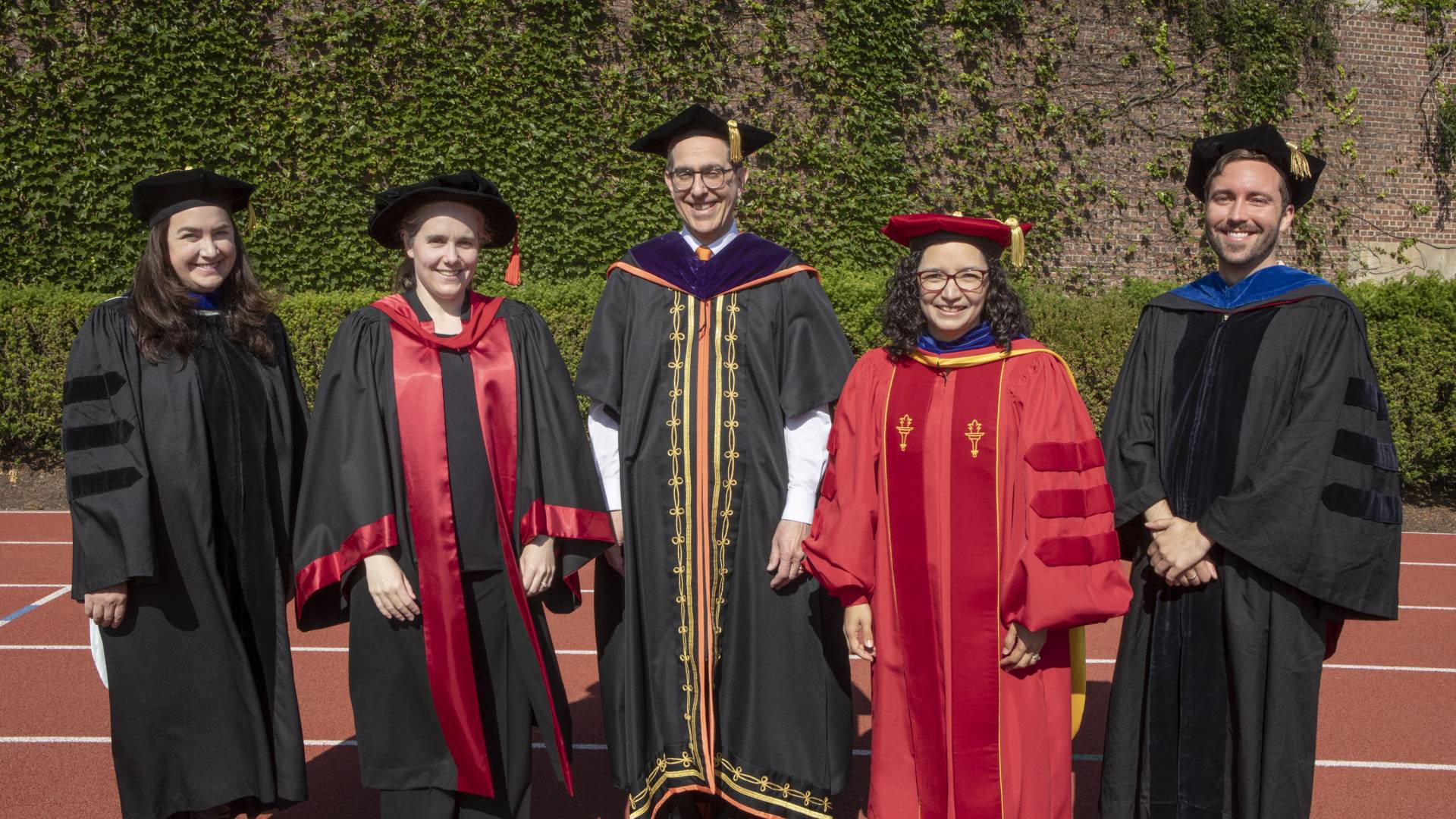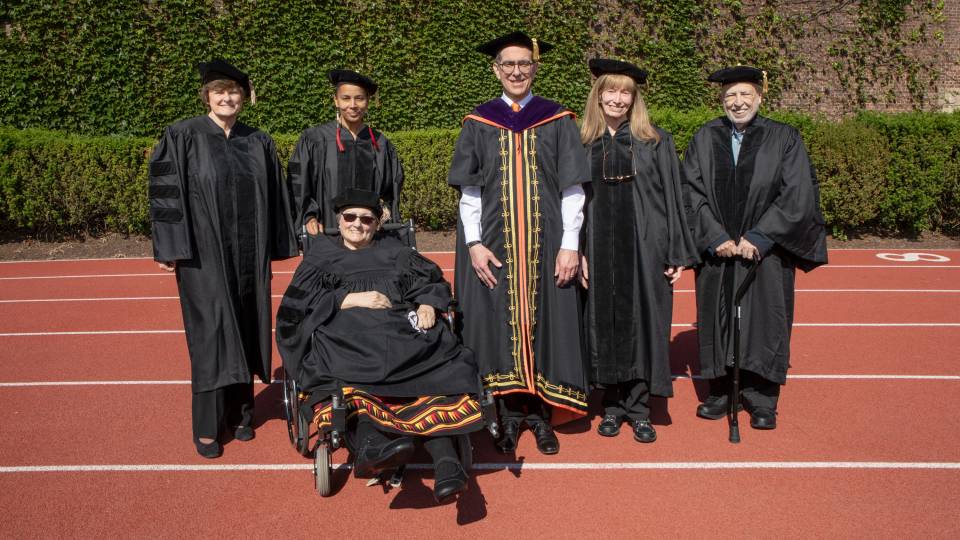Four Princeton University faculty members received President’s Awards for Distinguished Teaching at Commencement. From left: Tamsen Wolff, Claire White, Princeton University President Christopher L. Eisgruber, Rosina Lozano and Jesse Gomez.
Four Princeton University faculty members received President’s Awards for Distinguished Teaching at Commencement ceremonies Tuesday, May 30.
They are Jesse Gomez, assistant professor of Princeton Neuroscience Institute; Rosina Lozano, associate professor of history; Claire White, associate professor of civil and environmental engineering and the Andlinger Center for Energy and the Environment; and Tamsen Wolff, associate professor of English.
The awards were established in 1990 through a gift by Princeton alumni Lloyd Cotsen of the Class of 1950 and John Sherrerd of the Class of 1952 to recognize excellence in undergraduate teaching by Princeton faculty members. Each winner receives a cash prize of $5,000, and their departments each receive $3,000 for the purchase of new books.
A committee of faculty, academic administrators, undergraduates and graduate students selected the winners from nominations by students, faculty colleagues and alumni.
Following are testimonials from their students and peers, and their official citations from the Commencement ceremony.
Jesse Gomez
Jesse Gomez, assistant professor of Princeton Neuroscience Institute (PNI), joined the faculty in 2020. He specializes in human cognitive neuroscience and brain development.
Since Gomez began teaching “Introduction to Cognitive Neuroscience” and redesigned the curriculum in 2021, its enrollment has nearly doubled, and about 15% of all Princeton students now take the course.
“Jesse’s creative lectures and discussions were incredibly well received amongst the undergraduates, so much so that we have seen a sizeable spike in the number of undergraduate concentrators in neuroscience,” said a colleague. “Jesse has played an instrumental role in engaging not only with the undergraduate population, but also helping to foster a more inclusive and dynamic training environment for our graduate students.”
A mentee said Gomez “is a model of inclusive leadership, compassionate teaching and joy for the sciences.” He regularly recruits students through Princeton’s ReMatch program and PNI’s summer internship program as part of his mission to train first-generation students from underrepresented backgrounds and ensure their continued success in STEM.
Gomez has also worked with graduate students to ensure that their training is equitable, having helped to establish a student group for first-generation and underrepresented students to address obstacles experienced uniquely by these students.
A colleague said Gomez represents the institute’s highest standards and “encapsulates the best of what we hope for in our teachers: excellence in the classroom, combined with excellence in advising and mentoring individual students.”
Commencement citation: To be regarded as a cherished Princeton instructor within a few years of joining the faculty is a remarkable enough accomplishment, made more so in the case of Jesse Gomez, because he arrived at the University just before the COVID-19 pandemic. Students who had dispersed to learn remotely were soon captivated by “Dendrites & Dragons,” an interactive learning element that Professor Gomez designed as part of his curriculum for the rigorous “Introduction to Cognitive Neuroscience.” His reputation as a dynamic educator took hold. Enrollment in the course has nearly doubled, to 250 students, since Professor Gomez began teaching it, and he has become a coveted adviser and mentor. His laboratory has already published a landmark journal paper. “In short,” said an admiring colleague, “Professor Jesse Gomez encapsulates the best of what we hope for in our teachers.”
Rosina Lozano
Rosina Lozano, associate professor of history, has been a member of Princeton’s faculty since 2013. She is a United States historian with a research and teaching focus on Latino/a/x history, the American West, migration and immigration, and comparative studies in race and ethnicity.
Both graduate and undergraduate students know Lozano as a teacher who will challenge them and also support them every step of the way.
She requires students to attend office hours, helping to demystify them for students and ensuring that everyone has the opportunity to be successful in her classes. “Her approachable and encouraging nature made it easy to ask her questions after class or ask for more material on a particular topic,” said one student.
Lozano adapts lessons to her students’ interests and learning styles, while also providing them with opportunities to make their own intellectual contributions to our collective understanding of U.S. racial, ethnic and immigration history.
She encourages students to lead and sustain discussions, and she solicits their input about their reading after every class, asking students to write down on a notecard a question or observation that she then highlights at the beginning of the next class. Said another student, “She works to empower us as historians and as active participants in our collective present and future.”
A colleague remarked, “Professor Lozano’s generosity to and care for students is boundless.”
Commencement citation: As Rosina Lozano came under consideration for this award, a flood of letters poured into the Department of History from former students and advisees in support of a beloved and distinguished scholar, “whom many students identify as not only the best professor of their Princeton careers,” a colleague noted, “but the professor who has had the greatest impact on the direction of their lives after graduation.” The recommendations, many from first-generation college students, spoke to Professor Lozano’s pedagogical craft and the rigor she expected from students in her lectures and seminars focused on Latino studies, immigration and migration, political history, race and ethnicity, and social history. As one student remarked, “She pulls greatness out of her students.” They also marveled at her seemingly constant availability and her tireless support for their aspirations. One colleague wrote: “Professor Lozano’s generosity to and care for students is boundless.”
Claire White
Claire White, associate professor of civil and environmental engineering and the Andlinger Center for Energy and the Environment, has been a faculty member since 2013. Her research focuses on understanding and optimizing engineering and environmental materials, with an emphasis on sustainable cements and materials for carbon capture, utilization and storage.
White imparts her pioneering knowledge of sustainable materials with a consistently engaging and innovative approach to learning that “turns cement into magic,” in the words of one student. “I’ve had the opportunity to sit in on a few of her lectures, and I can’t forget her flawless ability to engage and keep the audience captivated,” said a postdoctoral researcher.
Beyond her excellence in the classroom and the laboratory, she is devoted to her students’ growth through mentorship. “She has a talent for creating a supportive and collaborative learning environment,” said a colleague.
Her students said White maintains high standards, yet never hesitates to assist them when they are struggling, or to exchange scholarly insights. “Every idea I have come up with is welcomed and met with an interesting and fruitful discussion,” said a mentee. “One of her most impressive qualities is empathy.”
Through her teaching, she attracts students to her classes from across disciplines and majors. Both undergraduate and graduate students commented on White’s impressive knowledge of her subject area, as well as her careful guidance of their own budding research.
Commencement citation: Those with the fortune to attend an engineering course taught by Claire White, or to conduct research alongside the renowned pioneer in sustainable cements and materials, tend to come away dazzled. Her captivating asides and anecdotes, “which she sprinkles like magic dust over her lectures,” in the words of one colleague, spin cement into gold. Former undergraduates, graduate students, and postdocs recall her as an inspirational lecturer and generous mentor whose dedication to Princeton’s research and teaching mission defined their impression of what it takes to be a scholar. Professor White’s unwavering support and infectious enthusiasm, said one lab member, “have made even the most frustrating moments less discouraging and ambitious goals more accessible.” Doctoral advisees who now work as tenure-track faculty at top universities are thriving testaments to her devotion.
Tamsen Wolff
Tamsen Wolff, associate professor of English, joined Princeton’s faculty in 2001. She specializes in modern and contemporary drama and performance, gender studies, cultural studies, voice, directing and dramaturgy.
Wolff’s practice as an actor and director is infused into her teaching and mentorship. She was among the first to teach musical theater as a form of dramatic literature at a university and laid the groundwork for Princeton’s Program in Music Theater. A colleague said she is “a brilliant scholar and critic who at once challenges and inspires her students. She’s able to connect with students as critics and theorists, and as an artist and performer.”
A former student recalled Wolff’s “exceptional clarity of thought, her analytical brilliance, her passion for the material, her love of teaching, and her confidence.” A former thesis advisee remarked that Wolff was “the best editor I have ever had. … Tamsen showed me how to communicate with humor and straightforwardness, with originality and open-mindedness, and entirely without pretension.”
Wolff’s dedication is visible in her service as director of undergraduate studies for the English department, her advising to countless student productions, and her generous guidance on hundreds of senior theses. Said a former student, “Tamsen changed the way I read, the way I write, the way I see the world, and the way I continue to navigate my way through it.”
Said another, “Four years after I graduated from Princeton, she remains an exemplar of how to think and talk and live.”
Commencement citation: To observe Tamsen Wolff’s public speaking course is to understand how the practices of acting and directing inform her scholarship and teaching. “Students study texts, they scruple and dispute,” a colleague noted, “but they also pay attention to their breathing, their posture, the somatics of communicating meaning, and feeling, in real time.” Professor Wolff has been a pioneer in teaching musical theater as a serious form of dramatic literature, and her admirers are legion. Her dedication is manifest in her service as director of undergraduate studies for the Department of English, her advising to countless student productions, and her generous guidance on hundreds of senior theses. According to a former student, “Tamsen changed the way I read, the way I write, the way I see the world, and the way I continue to navigate my way through it.”
























